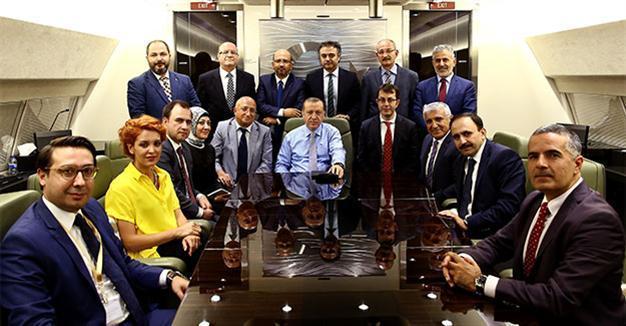Turkey, US mull move on ISIL stronghold Raqqa
Vahap Munyar - HANGZHOU

AA photo
Ankara and Washington are discussing military action on Raqqa, the capital of the Islamic State of Iraq and the Levant (ISIL), Turkish President Recep Tayyip Erdoğan has told a group of journalists on his way back to Turkey from the G-20 summit in China, where he had a tête-à-tête meeting with U.S. President Barack Obama.“Raqqa is an important center for Daesh,” Erdoğan said, using an Arabic acronym for the jihadist group. “Obama particularly wants to do something together [with us] about Raqqa. We have told him that this is not a problem for us.”
Turkey has suggested the high-ranking soldiers of both parties could come together and discuss the issue, and “then what is necessary will be done,” he said.
“This is an issue that we have been discussing with the United States,” he said while responding to a question on whether Turkey would play a role in reclaiming Raqqa.
“What can be done there will become more concrete after talks,” he said. “What can be done on the issue is related to the U.S. stance.”
Turkey does not have the option of taking a step back on Syria or else terror groups will fill in the gap, Erdoğan added.
“From now on, we have to show that we exist in the region. We do not have an option to step back at this point,” the president said, adding that terror groups, such as ISIL, the outlawed Kurdistan Workers’ Party (PKK), the Syrian Kurdish Democratic Union Party (PYD) or its armed wing, the People’s Protection Units (YPG), would settle there.
Turkey says the PYD is linked to the PKK, which has accelerated its attacks in Turkey, but the PYD and its armed wing is an ally with the U.S. in the region in the anti-ISIL fight.
Responding to a question as to whether the U.S. has changed its stance on the PYD, Erdoğan said Turkey had not experienced any difficulty in cooperating with its partner during the Euphrates Shield operation.
“We worked very comfortably in al-Rai. We did son in Jarablus, and are still doing so,” he said, adding that during a meeting by the two leaders on the sidelines of last year’s G-20 summit in Antalya, Turkey and the U.S. initially jointly developed a plan to remove ISIL from an area of 95 by 40 kilometers inside Syria, only for the plan to be delayed.
“At least the practice is quite different now,” he said.
The Turkish border with Syria was cleared of ISIL militants on Sept. 4 after the Turkish-supported Free Syrian Army (FSA) took control of all regions from Azaz to the west to Jarablus to the east. The news came 12 days after the Turkish army launched Operation Euphrates Shield, aimed at improving border security, supporting coalition forces and eliminating the threat posed by terrorist organizations, especially ISIL.
The president displayed a map to journalists on the plane, elaborating on how the military operation in Syria had succeeded.
The task to the west of the ISIL-held area by the Turkish border eased when Turkey-backed rebels advanced to the east following the seizure of al-Rai, which has become a logistics base.
Seizing a bridge over the Euphrates River, which has a strategic positioning, also eased matters, Erdoğan said.
The Turkey-backed forces are situated at a point close to al-Bab, which is another ISIL-stronghold before Raqqa, he added.
Similar terror group risks are also present in Iraq, Erodğan said.
“The PKK wants to find a place for itself there,” he said, naming Mosul and Telafer in its south. “There are Turkmens in Telafer. It is not clear what will happen there,” he said, noting that Masoud Barzani, the leader of the autonomous Kurdish Regional Government (KRG) in Iraq’s north, has demanded support from Turkey there.
The president said Turkey has not planned any camps for residents in the areas that have been captured but “real houses.”
















